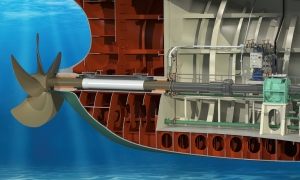


(Posted on 08/09/23)
Nippon Kaiji Kyokai (ClassNK) has joined the major classification societies to amend its rules relating to the inspection of seawater-lubricated propeller shaft systems.
The amendment means that ships with open seawater-lubricated propeller shafts that are built to ClassNK rules are subject to the same 15-year shaft withdrawal inspection periods as oil-lubricated shafts and sterntubes, subject to monitoring criteria.
The announcement brings ClassNK’s requirements in line with those of other large class societies, including Lloyds Register (LR), the American Bureau of Shipping (ABS), Det Norske Veritas (DNV), Bureau Veritas (BV) and the China Classification Society (CCS), which have already stipulated 15-year or longer intervals between inspections, some of them since 2016.
In its amendments to the Rules and Guidance for the Survey and Construction of Steel Ships , published on 30 June 2023, ClassNK clarified its reasons for the change: “In recent years, the development of mechanical type sealing devices, and bearings with lower wear properties as well as improvements in corrosion prevention technology, have led to fewer wear and corrosion defects in both shafts and bearings. In addition, interest in seawater-lubricated bearings, which do not use lubricating oil, and their effectiveness has increased among relevant industry members due to concerns for the environment.”
ClassNK also noted that the amendment follows requests received from industry stakeholders relating to the developments made in advanced seawater-lubrication system technology.
Thordon Bearings is one of the companies that has supported calls for industry-wide standardization of extended shaft withdrawals for seawater-based lubrication solutions that are now comparable to sealed oil lubricated systems.
Craig Carter, Vice President of Business Development, Thordon Bearings, said: “We are delighted that ClassNK has now joined the other major classification societies in dispensing with the wholly unnecessary and costly need to withdraw a seawater-lubricated propeller shaft for inspection every five years. Technology has come a long way since the first-generation seawater-lubricated lignum vitae bearings of the 1950s.”
While the risk of shaft corrosion in open seawater-based systems was historically a concern with first-generation bearings, leading some classification societies to continue demanding enhanced inspection regimes, new materials and technologies mean seawater-based systems can exceed the performance and reliability of their oil-based counterparts.
Elena Corin, Senior Manager, Special Marine Projects, Thordon Bearings, explained: “Aside from our pioneering polymer bearing technology, Thordon has enabled the development of Thor-Coat - a toughened, modified epoxy coating, which is applied to exposed steel areas of the shaft between the liners to eliminate the need for shaft withdrawal. In the event of damage, seawater cannot wick under the coating along the shaft and the epoxy coating is spot repairable.”
As the global leader among seawater-lubricated propeller shaft bearing manufacturers, Thordon Bearings has concentrated over 40 years of research and development to produce a solution proven to be more in line with the decarbonization movement of the 21st century than its antiquated oil-lubricated cousin.
“It is undeniable that the increasing number of ocean-going tankers, bulkers, dry cargo vessels, passenger ferries, cruise ships and containers that now routinely specify a Thordon propeller shaft bearing are significantly more environmentally and operationally efficient than their oil-based equivalents,” Corin said. “Thordon’s COMPAC open seawater-lubricated propeller shaft bearing system ensures zero environmental impact, improves fuel efficiency and eliminates the costs associated with managing oil discharges.”
In addition to the amendment regarding the inspection of seawater-based propulsion systems, Class NK has also updated several other requirements. These include new formulae for sloshing loads and new requirements for the maintenance and management of offshore wind turbine installations.
Other changes include clarification of scope for protection against fire when transferring cargo to other vessels on liquefied gas carriers, clarification of the NOx emission standards for biofuel, new requirements for cast and forged steel products, and amendments to safety requirements for reciprocating internal combustion engines.
Alfa Laval has completed the acquisition of UK-based NRG Marine, a leading provider of ultrasonic anti... Read more
In a landmark moment for the global maritime industry, the Maritime Battery Forum (MBF) and the Zero... Read more
Bruks Siwertell Group has announced a leadership transition as Peter Jonsson steps down as CEO after... Read more
ClassNK has issued an approval in principle (AiP) for a Rigid Windsail Type Wind-Assisted Propulsion... Read more
Elcome International’s new high-speed internet service, WELCOME, is revolutionising the way ship... Read more
Kaiko Systems, a leader in AI-driven frontline intelligence for the maritime industry, today announced... Read more
Marcegaglia’s latest acquisition, the LHM 600, marks a significant milestone as the 2,000th mobile... Read more
The Isle of Man Ship Registry (IOMSR) is playing a key role in the development of a high-tech sail aimed... Read more
AtoB@C Shipping, subsidiary of ESL Shipping, has taken delivery of Terramar in Goa, India on 14 March... Read more
As a new strategy period commences, VIKING Life-Saving Equipment A/S has achieved strong financial results... Read more